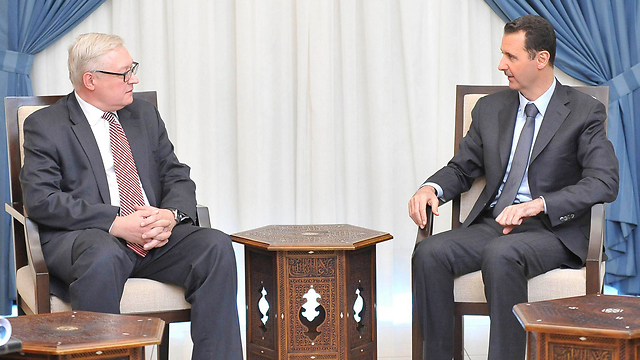
Meanwhile, the UN Security Council will start talks Monday on a statement regarding the humanitarian crisis in Syria which could include a controversial call to allow cross-border aid missions, diplomats said.
Related stories:
- UN votes to eliminate Syria's chemical weapons
- Hezbollah gambles all in Syria
- Assad threatens to 'blind' Israel
In his interview to Italian TV, Assad said: "We joined the international agreement against the acquisition and use of chemical weapons even before this resolution was passed," he said when asked if Syria would comply with Friday's UN resolution.
The UN Security Council adopted a resolution on Friday that demands the eradication of Syria's chemical weapons but does not threaten automatic punitive action against Assad's government if it does not comply.
"The central part of it is based on what we ourselves wanted. So it is not about a resolution, in reality it is our own intention," he said, according to the Italian translation of his remarks.
"In 2003, the UN Security Council proposed liberating this entire region from these arms and declaring the Middle East a region free of chemical weapons. So it is obvious, we have to respect these conditions, it is part of our history," he said. "We have to respect all treaties we sign."

Assad with Russia's Deputy FM Sergei Ryabkov (Photo: Reuters)
In the meantime, UN Security Council members Australia and Luxembourg are pressing for a statement to follow up on Friday's resolution. Australia is targeting agreement by Wednesday when it hands over the rotating council presidency to Azerbaijan.
Particular attention will be put however on the stance of Russia, the key ally of Syrian President Bashar Assad, in the informal talks to start Monday, diplomats said.
A draft statement obtained by AFP said: "The Security Council is appalled at the unacceptable and escalating level of violence and the death of more than 100,000 people in Syria."
It "condemns the widespread violations of human rights and international humanitarian law by the Syrian authorities, as well as any human rights abuses and violations of international humanitarian law by armed groups."
The statement would urge Assad's government to "take immediate steps to facilitate the expansion of humanitarian relief operations, and lift bureaucratic impediments and other obstacles."
Syria has blocked the work of aid groups wanting to send help to the nearly six million Syrians inside the country who have fled their homes.
It has restricted visas for UN and foreign aid groups operating in the country and set tough conditions for their aid deliveries, particularly inside opposition controlled areas, diplomats said.
The statement says the Syrian authorities must improve imports of equipment such as "communication tools, protective armored vehicles and medical and surgical equipment, needed for humanitarian operations."
The statement says Syria should allow "safe and unhindered humanitarian access to people in need through the most effective ways, including across conflict lines and, where appropriate, across borders from neighboring countries."
UN humanitarian chief Valerie Amos has called on the Security Council to consider approving cross-border operations.
Private groups already send or smuggle aid across the border, but the UN needs permission from the government.
The Syrian government has opposed aid deliveries from surrounding countries because it believes much of the aid would go to opposition areas, diplomats said.
"Russia has also spoken out on this in earlier talks and we will have to see if their attitude has changed with the passing of the new resolution," said one UN diplomat.
AFP, Reuters and the Associated Press contributed to this report
- Receive Ynetnews updates
directly to your desktop















